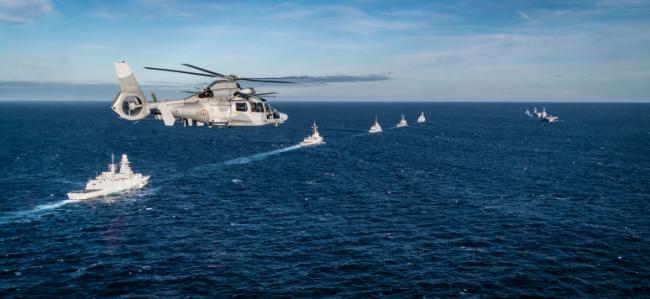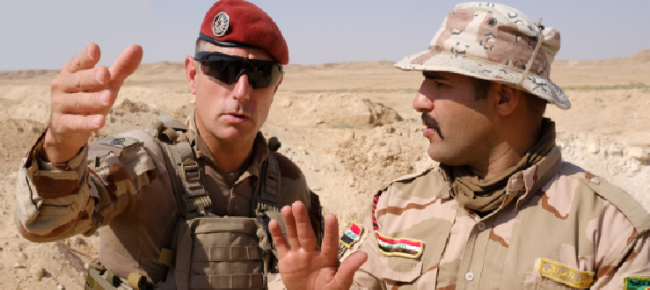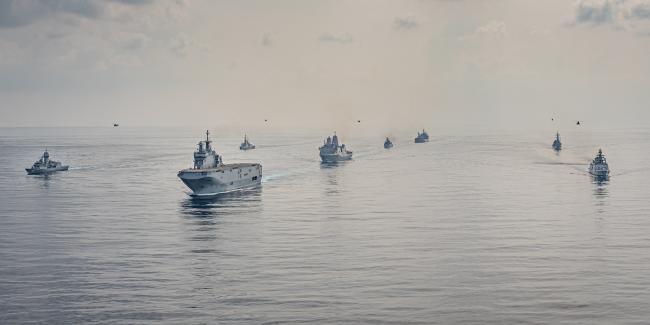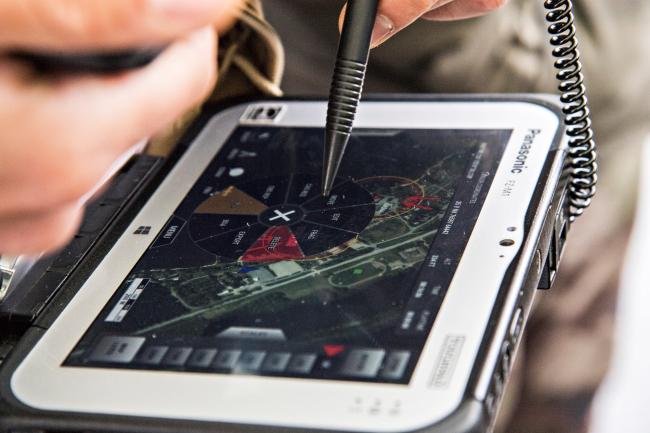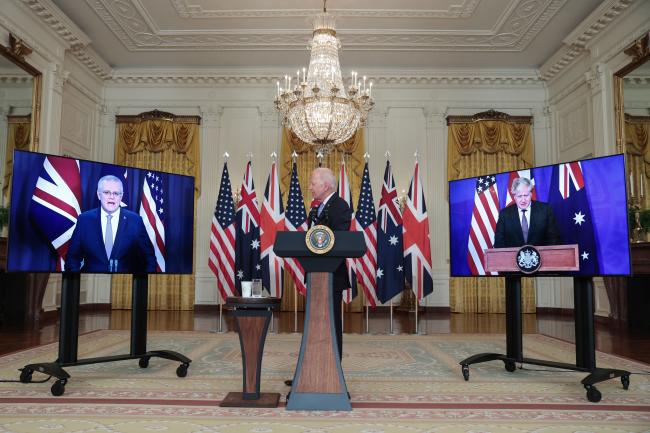Security - Defense
As a result of global strategic competition, security and defense issues are marked by the return of major wars and nuclear deterrence, the transformation of terrorism and the race for military technologies.
Related Subjects

Turkey and France - Allies or Rivals: Opportunities to be Seized

As international relations have become increasingly unpredictable, the quest is to find a semblance of normality. Alliances are shifting as interests are changing. The so-called order established after the Second World War is being shattered by those who have given so much to create it. Global relations are being transformed by countries that wish to follow the rules and others that want to circumvent or ignore them. In this uncertain environment, it is therefore all the more crucial to find stable allies.
Naval Combat Redux: A Renewed Challenge for Western Navies
Our world is becoming increasingly contested and unpredictable and we are trending towards a return of great power strategic competition, characterized by more frequent challenges to the established rules-based international order. As a consequence, the risk of interstate conflict continues to rise. This regressive evolution is most readily apparent in the maritime domain, where the concomitant impacts on the free flow of international trade and the control of illegal and unregulated fishing are interlaced with the prescient, yet growing challenge of environmental security.
France's strategic thinking in the Middle East is at a standstill
French President Emmanuel Macron was poised to arrive in Jordan for a two-day visit starting on Tuesday, December 20. French troops are deployed in the country as part of the Chammal military operation. Héloïse Fayet, a researcher with the Institut Français des Relations Internationales (French Institute of International Relations) who specializes in the armed forces present in the Middle East, told Le Monde that the terrorist threat in the region was almost eliminated. This, she said, should lead Paris to rethink its strategy. Ms. Fayet published a study in mid-November examining France's strategic posture in the Middle East.
Self-defense Groups, the Pyromaniac Firefighters of Sahel
Since 2012, the proliferation of jihadist groups across the Sahel has monopolized the attention of the authorities.forced by the threats they represent and the weakening of their regal power, states are gradually withdrawing from their peripheral rural territories. As a result, populations have organized themselves to become local security providers.
Democratic Republic of Congo: Nothing New in the East
While a state of siege was declared a year ago in two Congolese provinces and Kenyan authorities organized a meeting in Nairobi between the Congolese government and armed groups, the pacification of the Congolese East remains unresolved. This study looks back at the Tshisekedi government's policy and handling of this issue since 2019.
Military Stockpiles: A Life-Insurance Policy in a High-Intensity Conflict?
The war in Ukraine is a reminder of the place of attrition from high-intensity conflict in European armies that have been cut to the bone after three decades of budget cuts. All European forces have had to reduce their stocks to the bare minimum. As a result, support to Ukraine has meant a significant drain on their operational capabilities. A significant amount of decommissioned systems were also donated, due to the lack of depth in operational fleets.


How Rwanda Became Africa’s Policeman
From Benin to Mozambique, President Paul Kagame is flexing his small country’s military muscle—and transforming the continent’s security landscape.
What Strategic Posture Should France Adopt in the Middle East?
France has a historical presence in the Middle East, where it has many interests to defend: the fight against terrorism, the promotion of the arms industry, the dissemination of humanitarian values, etc. To this end, it has a number of resources at its disposal, notably military: French forces are deployed in Iraq, Syria and Jordan as part of Operation Chammal, in Lebanon for the United Nations Interim Force in Lebanon (UNIFIL), and in the United Arab Emirates.
France and AUKUS: Bouncing Back to Live up to Pacific Challenges
Back in September 2021, the announcement of AUKUS – the defense partnership between Australia, the United Kingdom (UK) and the United States (US) was a shock to Paris.
Open Innovation in Defense. Passing Fad or New Philosophy?
The use of civilian technologies on the battlefield—one of the lessons that can be drawn from recent conflicts—is attracting growing interest from the armed forces of France and other nations. The growing number of examples of effective integration of civilian technologies into the armed forces, including during conflict, shows the importance of open innovation and the acceleration of the international race toward innovation in the defense industry.
The historical heritage of AUKUS: Australia-United States-United Kingdom relations since 1900
The signing of the AUKUS partnership agreement between Australia, the United States and the United Kingdom in September 2021 seems to have reconstituted a natural coalition between “Anglo-Saxon” states. This solidarity generates contradictory judgments.
Cruise Missiles and NATO Missile Defense: Under the Radar?
The purpose of this paper is to demonstrate that the threat of cruise missile proliferation is as equally challenging to NATO as the threat of ballistic missiles. Over the last two decades, the emergence of cruise missiles and UAVs as a threat has been slow, and governments, particularly the United States, have invested much less in cruise missile defenses than in ballistic missile defenses.
Dancing with the Bear: Managing Escalation in a Conflict with Russia
"Escalation", the tendency of belligerents to increase the force or breadth of their attacks to gain advantage or avoid defeat, is not a new phenomenon. Systematic thought about how to manage it, however, did not crystallize until the Cold War and the invention of nuclear weapons.
Helicopter Warfare: The Future of Airmobility and Rotary Wing Combat.
Military helicopters have evolved into technologically sophisticated weapon systems. Originally designed to counter Soviet armor, attack helicopters now have to cope with a wide spectrum of threats, some of them bringing them back to their counterinsurgency roots.
Libya: Old or New Picture? Risks of political uncertainty for the gas and oil business
Libya has an opportunity to get back on track. The end of embargoes and sanctions after the conclusion of the “February Revolution” is favoring a fast production growth.
Digital Hoplites: Infantry Combat in the Information Age
FELIN, the world's first "integrated soldier system", will enter service in the French Army this year. Throughout history, infantrymen have sought to capitalize on technology while seeking the best compromise between three basic requirements: mobility, firepower and protection of combatants.
In Defense of Deterrence: the Relevance, Morality and Cost-Effectiveness of Nuclear Weapons
Since 1945, nuclear deterrence has frequently been the target of continuous criticism on strategic, legal and moral grounds. In the past five years, however, the renewed debate on nuclear disarmament has been accompanied by an increase in such criticism.
Toward the End of Force Projection? II. Operational Responses and Political Perspectives
For more than a decade, US defense circles have been concerned about the emergence of capabilities and strategies, which, as they spread, risk imperiling the United States" position in the world by their ability to disrupt or prevent force projection operations. Though most of the literature on such “anti-access” strategies focuses on the military aspects of the threat, this Focus stratégique - the second and last part of a two-part study - adopts a different perspective.
Intelligence and Nuclear Proliferation: Lessons Learned
Intelligence agencies play a fundamental role in the prevention of nuclear proliferation, as they help to understand other countries' intentions and assess their technical capabilities and the nature of their nuclear activities.
Toward the End of Force Projection? I. The Anti-Access Threat
Force projection has become a general posture and a fundamental dimension of the influence Western powers intend to exert over the world by means of their armed forces.
Russia's Nuclear Forces: Between Disarmament and Modernization
Nuclear weapons have traditionally occupied an important place in Russia’s national security strategy. As Russia and the United States have been reducing their nuclear arsenals since the end of the Cold War, their relationship has undergone a complex transformation. Russia, however, still considers strategic balance with the United States to be an important element of national security.
Support independent French research
Ifri, a foundation recognized as being of public utility, relies largely on private donors – companies and individuals – to guarantee its sustainability and intellectual independence. Through their funding, donors help maintain the Institute's position among the world's leading think tanks. By benefiting from an internationally recognized network and expertise, donors refine their understanding of geopolitical risk and its consequences on global politics and the economy. In 2024, Ifri will support more than 70 French and foreign companies and organizations.







